Breaking
B.C. introduces legislation to repeal historical wrongs dating back to 1871

British Columbia’s move Tuesday to extinguish discriminatory provisions in historical provincial legislation of which some dates back almost 150 years was described as pulling an embedded needle from a long suffering body. (Photo: Suzanne Anton/Facebook)
VICTORIA — British Columbia’s move Tuesday to extinguish discriminatory provisions in historical provincial legislation of which some dates back almost 150 years was described as pulling an embedded needle from a long suffering body.
David Choi, the National Congress of Chinese Canadians executive chairman, said the introduction of repeal legislation signals the government’s commitment to heal old wounds.
Choi attended a packed hall at the B.C. legislature where a ceremony was held following the introduction of the Discriminatory Provisions (Historical Wrongs) Repeal Act.
“Having the needle stuck in the body, it certainly needs to be pulled because then it becomes very reassuring that B.C. put their action where their mouth is,” he said.
Choi said the proposed repeal legislation helps keep the government’s May 2014 promise to address historical wrongs against Chinese Canadians and other minorities.
“In fulfilling the apology today marks another concrete step that British Columbians should be proud of, and it’s the right thing to do,” he said.
Teresa Wat, B.C.’s minister responsible for multiculturalism, said the government reviewed almost 2,000 pieces of legislation dating from 1871 to 1982 to remove provisions that were discriminatory on the basis of ethnicity or place of origin.
The time period covers when B.C. joined confederation until 1982, the year the Canadian Charter of Rights and Freedoms was introduced.
A government report released Tuesday said most B.C. laws are free from discrimination, but 19 historic acts with discriminatory provisions that primarily restrict employment based on ethnicity were found.
“The legislation review initiated by the Chinese Historical Wrongs Consultation concludes 19 private Acts containing discriminatory provisions may still be in effect,” said the 16-page review. “Despite the fact that these discriminatory provisions would be challenged in court under existing human rights legislation, government intent is to repeal them.”
The review report cited business development laws that state companies should not employ Chinese or Japanese workers or sell rights to Chinese people.
In May 2014, Premier Christy Clark formally apologized in the legislature for more than 100 racist laws, regulations and policies imposed against Chinese immigrants, calling them a stain on the province’s history.
Thousands of Chinese immigrants arrived in Canada starting in the 1880s to help build the country’s railway, but starting in 1885, the federal government imposed a head tax of $50, which rose to $500 by the early 1900s.
In 2006, the federal government offered an apology for the head tax and included $20,000 in compensation for families or survivors who paid the tax.





















